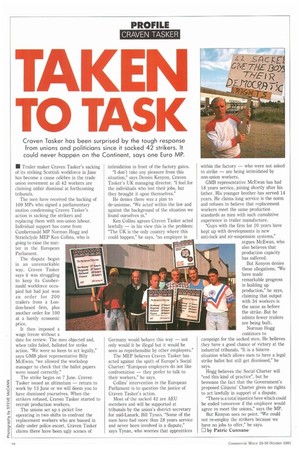TAKEN
Page 40

If you've noticed an error in this article please click here to report it so we can fix it.
TO TASK
Craven Tasker has been surprised by the tough response from unions and politicians since it sacked 42 strikers. It could never happen on the Continent, says one Euro MR
• Trailer maker Craven Tasker's sacking of its striking Scottish workforce in June has become a cause célèbre in the trade union movement as all 42 workers are claiming unfair dismissal at forthcoming tribunals.
The men have received the backing of 109 MPs who signed a parliamentary motion condemning Craven Tasker's action in sacking the strikers and replacing them with non-union labour. Individual support has come from Cumbernauld MP Norman Hogg and Strathclyde MEP Ken Collins, who is going to raise the matter in the European Parliament.
The dispute began in an unremarkable way. Craven Tasker says it was struggling to keep its Cumbernauld workforce occupied but had just won an order for 200 trailers from a London-based firm, plus another order for 100 at a barely economic price.
It then imposed a wage freeze without a date for review. The men objected and, when talks failed, balloted for strike action. "We were so keen to act legally," says GMB plant representative Billy McEwan, "we allowed the workshop manager to check that the ballot papers were issued correctly."
The strike began on 7 June. Craven Tasker issued an ultimatum — return to work by 13 June or we will deem you to have dismissed yourselves. When the strikers refused, Craven Tasker started to recruit production workers.
The unions set up a picket line operating in two shifts to confront the replacement workers who are bussed in daily under police escort. Craven Tasker claims there have been ugly scenes of intimidation in front of the factory gates.
"I don't take any pleasure from this situation," says Dennis Kenyon, Craven Tasker's UK managing director. "I feel for the individuals who lost their jobs, but they brought it upon themselves."
He denies there was a plan to de-unionise. "We acted within the law and against the background of the situation we found ourselves in."
Ken Collins agrees Craven Tasker acted lawfully — in his view this is the problem: "The UK is the only country where this could happen," he says, "no employer in Germany would behave this way — not only would it be illegal but it would be seen as reprehensible by other employers."
The MEP believes Craven Tasker has acted against the spirit of Europe's Social Charter: "European employers do not like confrontation — they prefer to talk to their workers," he says.
Collins' intervention in the European Parliament is to question the justice of Craven Tasker's action.
Most of the sacked 42 are AEU members and will be supported at tribunals by the union's district secretary for mid-Lanark, Bill Tynan. "Some of the men have had more than 28 years service and never been involved in a dispute," says Tynan, who worries that apprentices within the factory — who were not asked to strike — are being intimidated by non-union workers.
GMB representative McEwan has had 18 years service, joining shortly after his father. His younger brother has served 14 years. He claims long service is the norm and refuses to believe that replacement workers meet the same production standards as men with such cumulative experience in trailer manufacture.
"Guys with the firm for 20 years have kept up with developments in new anti-lock and air-suspension systems," argues McEwan, who also believes that production capacity has suffered.
But Kenyon denies these allegations. "We have made remarkable progress in building up production," he says, claiming that output with 34 workers is the same as before the strike. But he admits fewer trailers are being built.
Norman Hogg continues to campaign for the sacked men. He believes they have a good chance of victory at the industrial tribunals. "It is a bizarre situation which allows men to have a legal strike ballot but still get dismissed," he says.
Hogg believes the Social Charter will "end this kind of practice", but he bemoans the fact that the Government's proposed Citizens' Charter gives no rights to act lawfully in support of a dispute.
"There is a total injustice here which could be ended tomorrow if the employer would agree to meet the unions," says the MP.
But Kenyon sees no point. "We could not re-employ the strikers because we have no jobs to offer," he says.
CI by Patric Cunnane




























































































